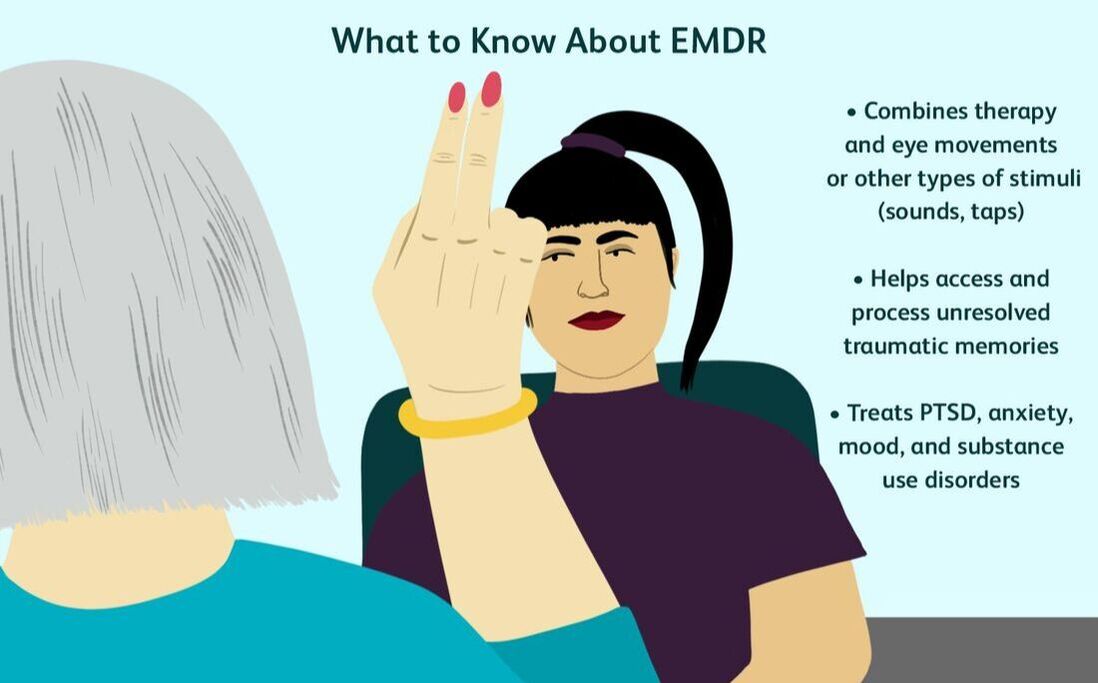EMDR - Eye Movement Desensitization and Reprocessing
Eye Movement Desensitization and Reprocessing (EMDR) is a highly effective therapeutic approach renowned for its multitude of benefits in addressing trauma, anxiety, and emotional distress. Developed by Francine Shapiro, EMDR combines cognitive therapy, exposure therapy, and bilateral stimulation to facilitate the processing and healing of distressing memories.
One of the standout advantages of EMDR is its remarkable efficiency. Unlike traditional talk therapies, EMDR often delivers results in a shorter time frame, alleviating emotional burdens and expediting recovery.
Central to EMDR's technique is the use of guided eye movements or bilateral stimulation, which mimics the brain's REM phase during sleep. This deliberate engagement aids in reprocessing traumatic memories, diminishing their negative impact and reducing distress over time.
The structured nature of EMDR fosters a sense of security during sessions. Clients acquire coping strategies to manage emotions that may surface, fostering empowerment and resilience in therapy and daily life.
EMDR's versatility is another key asset. Beyond trauma, it effectively addresses anxiety disorders, phobias, and performance anxiety. Its adaptability positions it as an invaluable tool in the therapist's arsenal.
Supported by substantial research, EMDR consistently demonstrates its efficacy in reducing post-traumatic stress symptoms and anxiety. Its evidence-based status underscores its credibility and suitability for diverse therapeutic contexts.
In conclusion, EMDR offers a swift, evidence-backed solution for trauma and emotional distress. By harnessing the brain's natural mechanisms, it provides rapid relief and restoration of emotional well-being. Its versatility and efficiency make it an indispensable asset in modern psychotherapy.
EMDR sessions last 80 minutes and cost €90 per session.
One of the standout advantages of EMDR is its remarkable efficiency. Unlike traditional talk therapies, EMDR often delivers results in a shorter time frame, alleviating emotional burdens and expediting recovery.
Central to EMDR's technique is the use of guided eye movements or bilateral stimulation, which mimics the brain's REM phase during sleep. This deliberate engagement aids in reprocessing traumatic memories, diminishing their negative impact and reducing distress over time.
The structured nature of EMDR fosters a sense of security during sessions. Clients acquire coping strategies to manage emotions that may surface, fostering empowerment and resilience in therapy and daily life.
EMDR's versatility is another key asset. Beyond trauma, it effectively addresses anxiety disorders, phobias, and performance anxiety. Its adaptability positions it as an invaluable tool in the therapist's arsenal.
Supported by substantial research, EMDR consistently demonstrates its efficacy in reducing post-traumatic stress symptoms and anxiety. Its evidence-based status underscores its credibility and suitability for diverse therapeutic contexts.
In conclusion, EMDR offers a swift, evidence-backed solution for trauma and emotional distress. By harnessing the brain's natural mechanisms, it provides rapid relief and restoration of emotional well-being. Its versatility and efficiency make it an indispensable asset in modern psychotherapy.
EMDR sessions last 80 minutes and cost €90 per session.
